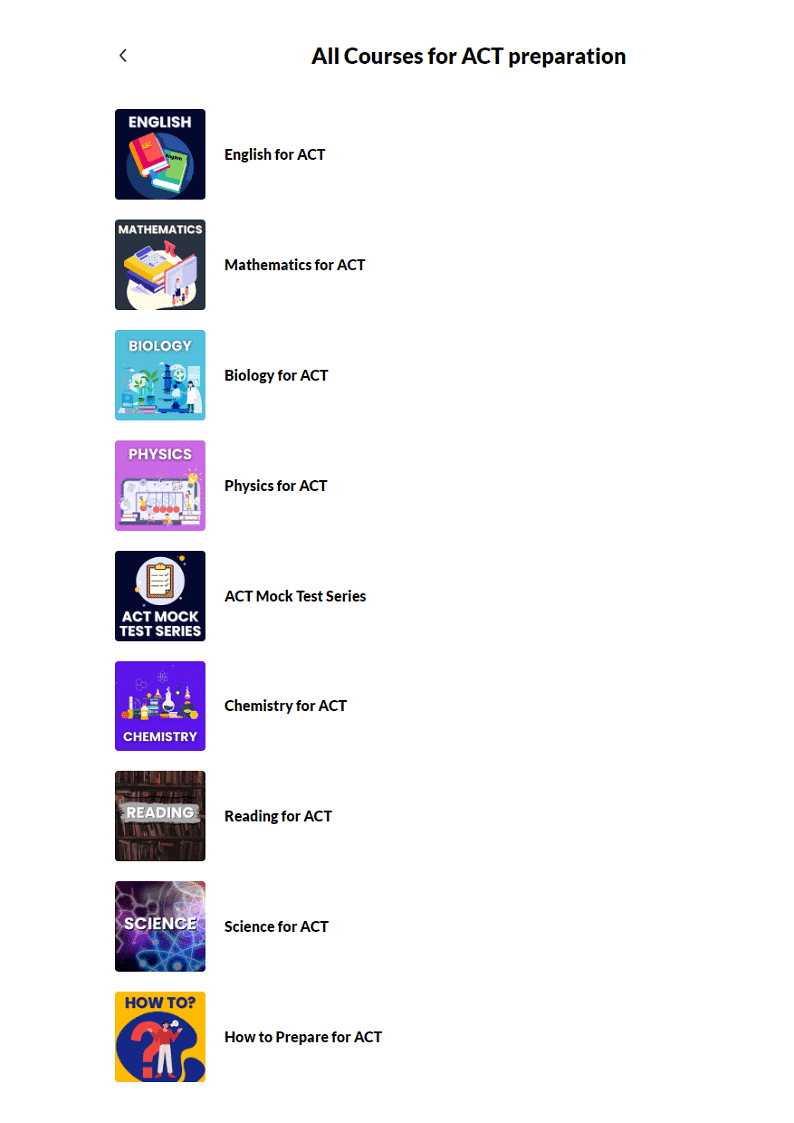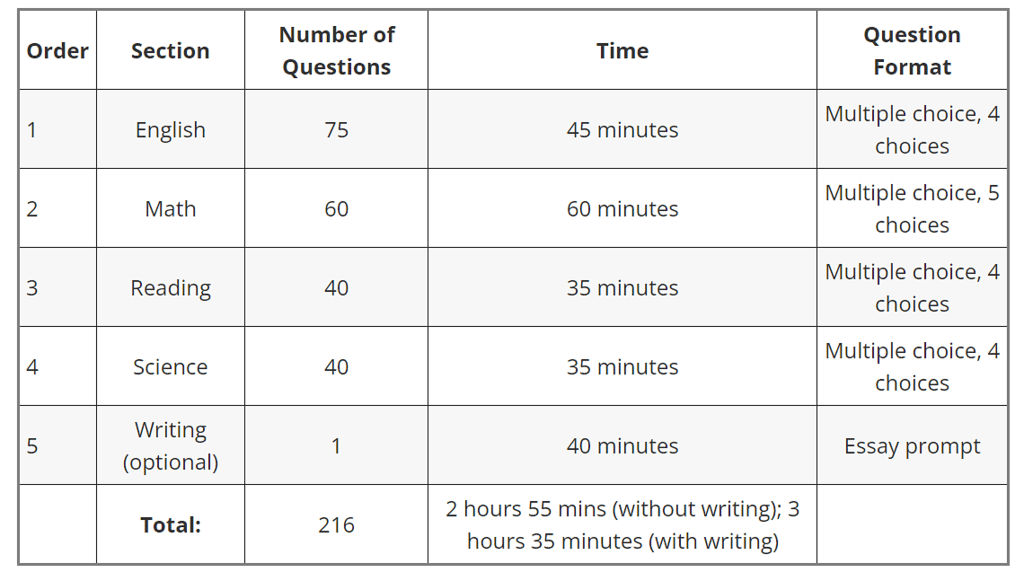Bible ACT: 8 Steps to Clear the ACT Exam | Mathematics for ACT PDF Download
Why did EduRev create this guide on How to prepare for the ACT?
- We aimed to provide a definitive answer to the question "How to Prepare for the ACT through self-study" in the most comprehensive and effective manner possible. Recognizing that students often expend significant time, energy, and resources preparing for the ACT without proper direction and guidance, we sought to address this gap.
- Our guide to the ACT exam is designed to be invaluable for every aspiring test-taker, offering essential insights and strategies to optimize their preparation and performance. We believe that with the right approach, students can confidently pursue their goals of achieving their desired scores and gaining admission to their preferred educational institutions.
Step by Step Preparation Strategy for ACT
- This section aims at helping you to devise a well-planned preparation strategy for the upcoming ACT exam. Let’s have a look at the fool-proof STEP by STEP preparation strategy for preparing for the ACT exam.

Step 1: Understand the Exam Pattern and Prepare Yourself
- Understand the Exam Structure and Content: While the ACT exam follows a defined structure, it's crucial to familiarize yourself with its sections, question types, and time constraints. Researching past papers and official ACT resources can provide valuable insights into the exam's format and content.

- Create a Study Plan and Schedule: Establishing a comprehensive study plan is essential for effective ACT preparation. Allocate dedicated time each day to review different sections of the exam, ensuring a balanced focus on English, Math, Reading, and Science. Factor in regular practice tests to gauge your progress and identify areas for improvement.
Step 2: Take a Diagnostic Test to Assess Your Skills
- Attempt Mock Tests: Begin your ACT preparation journey by taking a diagnostic test, such as a mock test. These resources offer invaluable insights into the ACT exam pattern, question types, topics covered, and format. By familiarizing yourself with the test's structure and content, you can better understand your strengths and areas needing improvement.
- Identify Strong and Weak Areas: Analyze your performance on the diagnostic test to identify your strong and weak areas. Take note of the sections or question types where you excel, as well as those requiring further attention. Tailor your study plan to prioritize practice and revision in areas where you need improvement while maintaining proficiency in your strong subjects.
- Utilize Performance Analysis Tools: Leverage tools provided by EduRev, such as detailed performance reports. These resources offer valuable feedback on your test-taking strategies, time management skills, and areas for improvement. Use this information to refine your study approach and track your progress effectively.
Step 3: Section-Wise Preparation
- Preparing for each section of the ACT requires different approaches because they test different skills. For example, getting ready for ACT English is not the same as preparing for ACT Math. Each section also has its own unique types of questions and formats. So, it's important to understand these styles before the test to avoid surprises, even if you know the material well.
Step 3.1: How to Prepare English for ACT
Content of ACT English
- Usage and Mechanics: This part focuses on punctuation, grammar, usage, and sentence structure. It requires knowledge of fine-tuned punctuation and grammar rules.
- Rhetorical Skills: This section emphasizes understanding the passage as a whole and maximizing organization and style. It includes strategy, organization, and style aspects.
- Strategy: Test how well you develop a topic and judge the effect of adding or revising supporting material.
- Organization: Tests how well you organize ideas and choose effective opening, transitional, and closing sentences.
- Style: Tests word and image selection, maintaining tone, and managing sentence elements for rhetorical effectiveness.
Know what ACT Grammar Rules to Expect
- You don’t need to memorize your grammar textbook to prep for the ACT. But it’s a smart move to review the most common grammar rules tested on the ACT English Test. You can find these on EduRev’s English for ACT course.
Let the Answers Help You
- The answer choices are your clues to identifying what the question is really asking. Do any of the words or punctuation change? Pay attention to what changes versus what stays the same in the answers to figure out what the potential error is.
Practice Makes You Perfect
- Understand the question types and test yourself by practicing the English section questions. Only by practicing you can master this section. Check out the Practice Questions provided by EduRev for English for ACT.
Step 3.2: How to Prepare Math for ACT?
Content of ACT Maths
- All of the math questions are five-choice, multiple-choice questions. These questions draw from six areas of math that most students have covered by the end of their 11th grade year: pre-algebra, elementary algebra, intermediate algebra, coordinate geometry, plane geometry, and trigonometry. You can find detailed notes of all these topics in Mathematics for ACT course on EduRev.
Know Your Properties
- Recognizing number properties will save you time on test day. Number properties rules include odds and evens, prime numbers, and the order of operations. You can pick numbers to help you remember the rules.
Pick Numbers to Avoid Complicated Algebra on ACT
- Avoid using algebra by picking numbers for variables. Arithmetic is almost always easier than algebra! Picking numbers is especially helpful for number properties questions. Pick numbers that follow the rules of the question and are small and easy to work with. Avoid picking 0 or 1 because they have special properties.
Step 3.3: How to Prepare Reading for ACT?
Content of ACT Reading
- There are four ACT reading passages of about 800 words each, always in this order:
- prose fiction
- social science
- humanities
- natural science
- After each passage, you’ll answer 10 questions that test you on what was directly stated as well as what meanings were implied in the text.
Understand and Practice
- Understand how to tackle the Reading section by thoroughly going through the Reading for ACT course provided by EduRev. The best way to determine which categories you tend to ace is through repeated practice tests.
Always read the passage first
- Many believe you should read questions before the passage, but it's tough to remember 10 answers while processing a 750-word text. Instead, focus on understanding the passage first, then tackle the questions.
Step 3.4: How to Prepare Science for ACT?
Content of ACT Science
- ACT Science prep begins with understanding what's on the ACT Science test.
- Format: 40 multiple choice questions about 7 science passages
- Topics: biology, chemistry, physics, and the Earth/space sciences such as astronomy, geology, and meteorology
- Most of the questions can be answered from the information presented in the passages or figures, but be prepared for 3-4 questions that require outside knowledge. You should be able to:
- Look up data and trends
- Make predictions
- Synthesize information
Adopt a Strategy for Each type
- The ACT Science Test has three types of passages:
- Data Representation
- Conflicting Viewpoints
- Research Summaries
- Each one needs a slightly different approach. Data Representation focuses on charts and graphs, so practice understanding what they show. Conflicting Viewpoints is like paired passages in the Reading Test. Research Summaries describe experiments, so understand their purpose, method, and results. Remember, each type is unique, so don't treat them all the same.
Revise Your Basics
You can brush up on your science basics from the courses provided for Science for ACT. These are:
- Chemistry for ACT
- Physics for ACT
- Biology for ACT
Step 3.5: How to Prepare Writing for ACT?
Content of ACT Writing
- It’s a 40-minute test to complete with pencil and paper
- You’ll get one essay prompt about a debatable topic and three different perspectives on it
- You have to:
- evaluate the three different perspectives
- present your own perspective (which may agree in part or in full with any of the provided viewpoints)
- explain the relationship between your viewpoint and the provided ones.
Practice
- Practice planning and writing essays on practice ACT essay prompts. Although writing full essays (preferably as part of ACT practice tests) is the best practice, ten-minute outlining sessions in which you plan out your essay (like you will do on the test) can go a long way in helping you learn how to quickly generate and organize your ideas.
Opinions
- Learn about current events and form your own opinions on them. Engage in lively debates with your friends and family so that you can practice supporting your opinions and anticipating opposing arguments!
Step 4: Set a Target Score
- Once you know where you stand, set a realistic target score for improvement. Consider how much time you have and aim for a score increase that's achievable within that timeframe.
- For example, improving by 1-2 points in a month is doable, but aiming for a 6-point increase might be too ambitious.
- Remember, the more points you want to improve, the more time you'll need to invest. Also, your target score should align with the requirements of the schools you're interested in.
- Ideally, aim for a score within the middle 50% range of admitted students at those institutions.
- This range represents the scores of the 25th to 75th percentiles of admitted students.
Step 5: Create a Study Schedule
- To ensure effective preparation for the ACT, it's important to establish a consistent study schedule. This means dedicating a set number of hours to studying each week leading up to the test, rather than cramming at the last minute. To determine how many hours you should study per week, divide the total number of prep hours you need by the number of weeks until the test.
- For example, if you need 80 hours of preparation and there are 12 weeks until the test, aim to study approximately 6 hours and 40 minutes per week.
- It's also beneficial to designate specific days and times for studying each week. This could involve studying for an hour every day except Sunday, when you study for 40 minutes, or allocating longer study sessions on Friday and Sunday afternoons, totaling 3 hours and 20 minutes.
- Establishing a consistent study routine helps maintain focus and discipline. Additionally, it's helpful to share your study schedule with someone else who can help keep you accountable and on track with your preparations.
Step 6: Practice, Practice & Practice
- Diversifying your question practice is paramount for ACT exam readiness. The ACT assesses various skills across its different sections, including English, Math, Reading, and Science.
- By exposing yourself to a wide range of question formats and styles, you can better adapt to the exam's challenges. Practicing different questions helps sharpen your problem-solving abilities, enhances your familiarity with the exam's structure, and boosts your confidence.
- It also enables you to identify your strengths and weaknesses more accurately, allowing for targeted improvement efforts.
- Ultimately, a comprehensive approach to question practice ensures that you are well-prepared to tackle any challenge that may arise on test day.
Step 7: Test Strategies
To do well on the ACT, it's not just about knowing the material; you also need effective strategies. This includes learning how to eliminate wrong answers, when to guess, time management, and specific tips for each section. With expert advice on these strategies, you can develop your own personalized approach to tackling the test.
- Answer every question to maximize chances of getting correct answers, as there's no penalty for wrong ones.
- Underline key words in questions across all sections to ensure comprehension and avoid mistakes.
- Use the strategy of eliminating wrong answers, particularly when unsure, to increase the likelihood of selecting the correct one.
- Aim to finish each section with extra time to recheck answers, especially for questions marked as uncertain.
Step 7.1: English Test Strategy
- Know your grammar rules
- Watch out for "no change" answers
Step 7.2: Writing Test Strategy
- Plan essay examples beforehand
- Cater to the essay graders
Step 7.3: Math Test Strategy
- Know the formulas
- Fill in content gaps
- Solve questions on your own first
Step 7.4: Reading Test Strategy
- Read your strongest topic area first
- Find the right passage reading strategy
- Predict the answer before looking at the choice.
- Rely only on direct evidence
- Get intellectually curious
Step 7.5: Science Test Strategy
- Do the conflicting viewpoints section last
- Rely on the visuals
- Don't be intimidated.
Step 8: ACT Exam Day Plan

- To maximize your chances of success on test day, adhere to your best test-taking practices. Prioritize a full night of restful sleep to ensure mental alertness and focus.
- Begin your day with a nutritious breakfast containing protein to sustain energy levels throughout the exam.
- Pack your bag with all necessary items, including sharpened pencils and an approved calculator, to avoid any last-minute stress.
- By attending to these details, you can feel confident and prepared to tackle the challenges of the ACT exam with clarity and efficiency.
|
144 videos|104 docs|61 tests
|
FAQs on Bible ACT: 8 Steps to Clear the ACT Exam - Mathematics for ACT
| 1. Why is it important to prepare for the ACT? |  |
| 2. How far in advance should I start preparing for the ACT? |  |
| 3. What are some effective study strategies for the ACT? |  |
| 4. How can I improve my time management skills for the ACT? |  |
| 5. What resources are available for ACT preparation? |  |
















